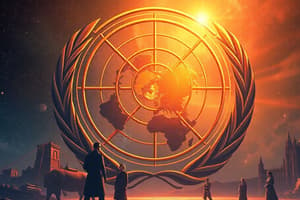Podcast
Questions and Answers
¿Cuál de los siguientes NO es un ejemplo de una agencia especializada de las Naciones Unidas?
¿Cuál de los siguientes NO es un ejemplo de una agencia especializada de las Naciones Unidas?
- Organización Mundial de la Salud (OMS)
- Organización de las Naciones Unidas para la Educación, la Ciencia y la Cultura (UNESCO)
- Organización Internacional del Trabajo (OIT)
- Organización Mundial del Comercio (OMC) (correct)
¿Cuál de los siguientes NO es un desafío o crítica que enfrenta la ONU?
¿Cuál de los siguientes NO es un desafío o crítica que enfrenta la ONU?
- Falta de poder e influencia para abordar conflictos y crisis globales.
- Dificultades para implementar decisiones y alcanzar consenso entre los estados miembros.
- Crecimiento económico sostenible y rápido en todos los países miembros. (correct)
- Ineficacia para resolver problemas internacionales complejos.
¿Cuál de las siguientes opciones describe mejor el papel de la ONU en la promoción del desarrollo sostenible?
¿Cuál de las siguientes opciones describe mejor el papel de la ONU en la promoción del desarrollo sostenible?
- La ONU proporciona fondos directamente a los países en desarrollo.
- La ONU promueve políticas y programas que abordan la protección ambiental, la erradicación de la pobreza y el crecimiento económico. (correct)
- La ONU solo se enfoca en problemas ambientales, no en la pobreza o el crecimiento económico.
- La ONU no tiene un papel en el desarrollo sostenible, ya que es responsabilidad de los estados miembros individuales.
¿Qué significa promover el respeto por los derechos humanos en el contexto de la ONU?
¿Qué significa promover el respeto por los derechos humanos en el contexto de la ONU?
¿Cuál de las siguientes es una razón por la que la ONU sigue siendo un foro importante para el diálogo y la cooperación internacionales?
¿Cuál de las siguientes es una razón por la que la ONU sigue siendo un foro importante para el diálogo y la cooperación internacionales?
¿Cuál es el principal órgano deliberativo y de toma de decisiones de las Naciones Unidas?
¿Cuál es el principal órgano deliberativo y de toma de decisiones de las Naciones Unidas?
¿Qué órgano de las Naciones Unidas tiene la responsabilidad principal de mantener la paz y la seguridad internacionales?
¿Qué órgano de las Naciones Unidas tiene la responsabilidad principal de mantener la paz y la seguridad internacionales?
¿Cuál es el papel del Consejo Económico y Social (ECOSOC)?
¿Cuál es el papel del Consejo Económico y Social (ECOSOC)?
¿Cuál de los siguientes órganos de las Naciones Unidas tiene un papel limitado en la actualidad?
¿Cuál de los siguientes órganos de las Naciones Unidas tiene un papel limitado en la actualidad?
¿Cuál de las siguientes opciones NO es una función clave de las Naciones Unidas?
¿Cuál de las siguientes opciones NO es una función clave de las Naciones Unidas?
¿Quién es el jefe administrativo de las Naciones Unidas?
¿Quién es el jefe administrativo de las Naciones Unidas?
¿Qué condición deben cumplir los estados para ser miembros de las Naciones Unidas?
¿Qué condición deben cumplir los estados para ser miembros de las Naciones Unidas?
¿Cuál de estos órganos de las Naciones Unidas NO tiene el poder de veto?
¿Cuál de estos órganos de las Naciones Unidas NO tiene el poder de veto?
¿Cuál de los siguientes es un reto que enfrenta la ONU?
¿Cuál de los siguientes es un reto que enfrenta la ONU?
El Secretario General de la ONU es elegido por:
El Secretario General de la ONU es elegido por:
¿Quién determina la capacidad de pago de cada estado miembro de la ONU?
¿Quién determina la capacidad de pago de cada estado miembro de la ONU?
La ONU se enfrenta al reto de mantener la credibilidad y la efectividad en un mundo en constante cambio. ¿Por qué?
La ONU se enfrenta al reto de mantener la credibilidad y la efectividad en un mundo en constante cambio. ¿Por qué?
Según el contenido proporcionado, ¿cuál de los siguientes es UN logro notable de la ONU?
Según el contenido proporcionado, ¿cuál de los siguientes es UN logro notable de la ONU?
¿Cuál de los siguientes es un principio fundamental en el que opera la ONU?
¿Cuál de los siguientes es un principio fundamental en el que opera la ONU?
¿Cuál es el principal órgano judicial de las Naciones Unidas que resuelve disputas legales entre estados?
¿Cuál es el principal órgano judicial de las Naciones Unidas que resuelve disputas legales entre estados?
¿Cuál de los siguientes órganos de la ONU tiene el poder de tomar decisiones vinculantes para los estados miembros?
¿Cuál de los siguientes órganos de la ONU tiene el poder de tomar decisiones vinculantes para los estados miembros?
¿Cuál de las siguientes es una función principal del Consejo Económico y Social (ECOSOC)?
¿Cuál de las siguientes es una función principal del Consejo Económico y Social (ECOSOC)?
¿Cuál de los siguientes NO es un objetivo principal de las Naciones Unidas, según la Carta de las Naciones Unidas?
¿Cuál de los siguientes NO es un objetivo principal de las Naciones Unidas, según la Carta de las Naciones Unidas?
¿Cuál es la sede principal de las Naciones Unidas?
¿Cuál es la sede principal de las Naciones Unidas?
¿Cuál de los siguientes órganos de la ONU tiene el poder de veto?
¿Cuál de los siguientes órganos de la ONU tiene el poder de veto?
Flashcards
Derechos Humanos
Derechos Humanos
Abogacía por derechos y libertades fundamentales para todos.
Desarrollo Sostenible
Desarrollo Sostenible
Promoción de protección ambiental y bienestar económico para todos.
Agencias Especializadas de la ONU
Agencias Especializadas de la ONU
Entidades que abordan áreas específicas de preocupación global.
Desafíos de la ONU
Desafíos de la ONU
Signup and view all the flashcards
Burocracia en la ONU
Burocracia en la ONU
Signup and view all the flashcards
Naciones Unidas (ONU)
Naciones Unidas (ONU)
Signup and view all the flashcards
Asamblea General
Asamblea General
Signup and view all the flashcards
Consejo de Seguridad
Consejo de Seguridad
Signup and view all the flashcards
Consejo Económico y Social (ECOSOC)
Consejo Económico y Social (ECOSOC)
Signup and view all the flashcards
Consejo de Administración Fiduciaria
Consejo de Administración Fiduciaria
Signup and view all the flashcards
Corte Internacional de Justicia
Corte Internacional de Justicia
Signup and view all the flashcards
Secretaría
Secretaría
Signup and view all the flashcards
Membresía en la ONU
Membresía en la ONU
Signup and view all the flashcards
Rol crítico de la ONU
Rol crítico de la ONU
Signup and view all the flashcards
Secretario General
Secretario General
Signup and view all the flashcards
Contribuciones de Estados
Contribuciones de Estados
Signup and view all the flashcards
Logros significativos
Logros significativos
Signup and view all the flashcards
Mantenimiento de la paz
Mantenimiento de la paz
Signup and view all the flashcards
Principio de igualdad soberana
Principio de igualdad soberana
Signup and view all the flashcards
Asamblea General (AG)
Asamblea General (AG)
Signup and view all the flashcards
Consejo de Seguridad (CS)
Consejo de Seguridad (CS)
Signup and view all the flashcards
Secretaría de la ONU
Secretaría de la ONU
Signup and view all the flashcards
Corte Internacional de Justicia (CIJ)
Corte Internacional de Justicia (CIJ)
Signup and view all the flashcards
Study Notes
Overview of the United Nations
- The United Nations (UN) is an intergovernmental organization dedicated to maintaining international peace and security, fostering friendly relations among nations, achieving international cooperation, and acting as a center for harmonizing actions between nations.
- Founded in 1945, the UN replaced the League of Nations, which had failed to prevent World War II.
- The UN's headquarters are located in New York City.
- Membership is open to all sovereign states that accept the UN Charter's obligations, operating on the principle of sovereign equality among member states.
Principal Organs of the UN
- The UN comprises several principal organs:
- The General Assembly (GA): The primary deliberative and representative body, composed of all member states. It discusses, recommends, coordinates international action, and elects members to other UN bodies.
- The Security Council (SC): Primarily responsible for maintaining international peace and security. The Security Council has 15 members, including 5 permanent members with veto power: China, France, Russia, the United Kingdom, and the United States.
- The Economic and Social Council (ECOSOC): Coordinates the economic and social work of UN agencies, promoting international economic cooperation and development.
- The Trusteeship Council: Supervised trust territories, now primarily inactive, as trust territories have transitioned to self-governance.
- The International Court of Justice (ICJ): The UN's judicial organ, resolving legal disputes between states under international law.
- The Secretariat: Provides administrative, legal, and technical support to the UN. Headed by the Secretary-General, the UN's chief administrative officer.
Membership
- Membership in the UN is open to all peace-loving states accepting the organization's obligations.
- Admission to membership is decided by the General Assembly upon recommendation from the Security Council.
Key Functions and Goals
- Maintaining international peace and security: Preventing conflicts, mediating disputes, implementing collective security measures.
- Developing friendly relations among nations: Encouraging cooperation and mutual understanding between countries.
- Achieving international cooperation: Facilitating collaboration on economic, social, cultural, and humanitarian issues.
- Promoting respect for human rights and fundamental freedoms: Advocating for the rights and liberties of all people.
- Fostering respect for the principle of equal rights and self-determination of peoples: Supporting the rights and aspirations of various entities.
- Acting as a center for harmonizing the actions of nations: Promoting collaboration and coordination among nations.
Specialized Agencies
- The UN works through specialized agencies and programs:
- World Health Organization (WHO)
- United Nations Educational, Scientific, and Cultural Organization (UNESCO)
- International Labour Organization (ILO)
- Food and Agriculture Organization of the United Nations (FAO)
- UNICEF, UNDP, and UNEP
- Other specialized agencies address global concerns like these.
Challenges and Criticisms
- The UN faces challenges:
- Limited power and influence in addressing global conflicts and crises.
- Ineffectiveness in resolving complex international issues.
- Difficulty implementing decisions and reaching consensus.
- Bureaucracy and inefficiency in certain operations.
- Concerns over funding, resource allocation, bias, or favoritism in decisions.
- Despite these challenges, the UN remains an important platform for dialogue and collaboration.
The Secretary-General
- The Secretary-General is the chief administrative officer of the UN, appointed by the General Assembly on the recommendation of the Security Council.
- The Secretary-General plays a critical role in maintaining peace and security worldwide.
Funding and Resources
- The UN's budget is funded by contributions from member states, based on their relative economic capacity.
- The UN budget reflects the priorities established by its various parts, concentrating on achieving its objectives and mandates.
Achievements and Challenges
- The UN has played a vital role in conflict prevention and resolution, humanitarian aid, and development.
- Achievements include reducing poverty and disease, advancing human rights, and enabling international cooperation.
- Challenges encompass limitations from state sovereignty, differing national interests, and maintaining impartiality. The UN also faces navigating geopolitical tensions and maintaining credibility and effectiveness in a constantly evolving global landscape.
Studying That Suits You
Use AI to generate personalized quizzes and flashcards to suit your learning preferences.




